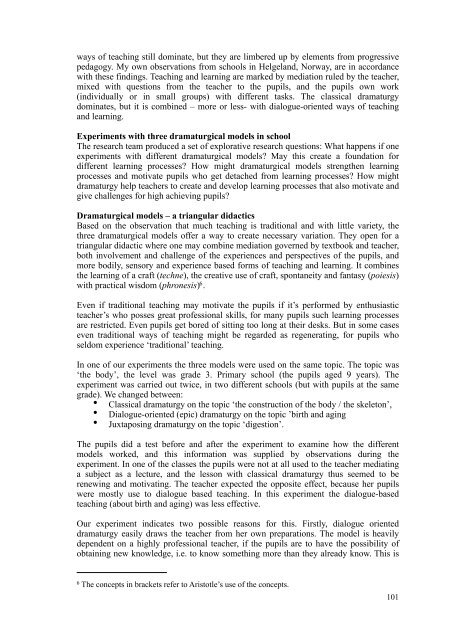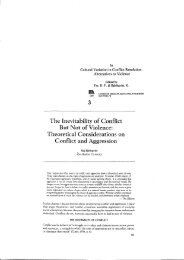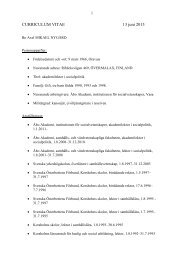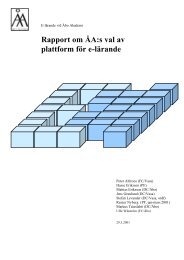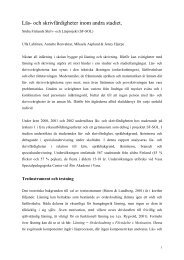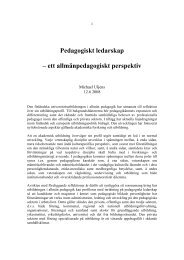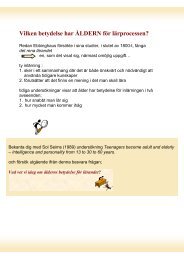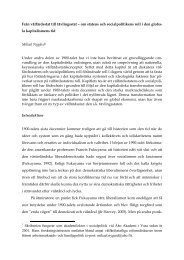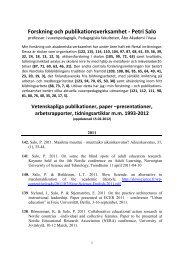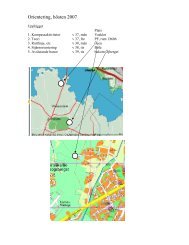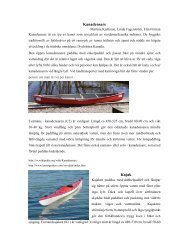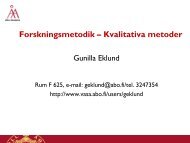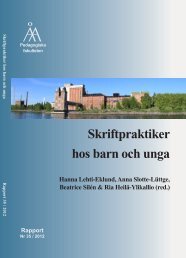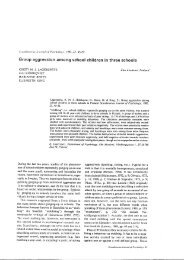Drama Boreale - Åbo Akademi
Drama Boreale - Åbo Akademi
Drama Boreale - Åbo Akademi
You also want an ePaper? Increase the reach of your titles
YUMPU automatically turns print PDFs into web optimized ePapers that Google loves.
ways of teaching still dominate, but they are limbered up by elements from progressive<br />
pedagogy. My own observations from schools in Helgeland, Norway, are in accordance<br />
with these findings. Teaching and learning are marked by mediation ruled by the teacher,<br />
mixed with questions from the teacher to the pupils, and the pupils own work<br />
(individually or in small groups) with different tasks. The classical dramaturgy<br />
dominates, but it is combined – more or less- with dialogue-oriented ways of teaching<br />
and learning.<br />
Experiments with three dramaturgical models in school<br />
The research team produced a set of explorative research questions: What happens if one<br />
experiments with different dramaturgical models? May this create a foundation for<br />
different learning processes? How might dramaturgical models strengthen learning<br />
processes and motivate pupils who get detached from learning processes? How might<br />
dramaturgy help teachers to create and develop learning processes that also motivate and<br />
give challenges for high achieving pupils?<br />
<strong>Drama</strong>turgical models – a triangular didactics<br />
Based on the observation that much teaching is traditional and with little variety, the<br />
three dramaturgical models offer a way to create necessary variation. They open for a<br />
triangular didactic where one may combine mediation governed by textbook and teacher,<br />
both involvement and challenge of the experiences and perspectives of the pupils, and<br />
more bodily, sensory and experience based forms of teaching and learning. It combines<br />
the learning of a craft (techne), the creative use of craft, spontaneity and fantasy (poiesis)<br />
with practical wisdom (phronesis) 6 .<br />
Even if traditional teaching may motivate the pupils if it’s performed by enthusiastic<br />
teacher’s who posses great professional skills, for many pupils such learning processes<br />
are restricted. Even pupils get bored of sitting too long at their desks. But in some cases<br />
even traditional ways of teaching might be regarded as regenerating, for pupils who<br />
seldom experience ‘traditional’ teaching.<br />
In one of our experiments the three models were used on the same topic. The topic was<br />
‘the body’, the level was grade 3. Primary school (the pupils aged 9 years). The<br />
experiment was carried out twice, in two different schools (but with pupils at the same<br />
grade). We changed between:<br />
• Classical dramaturgy on the topic ‘the construction of the body / the skeleton’,<br />
• Dialogue-oriented (epic) dramaturgy on the topic ’birth and aging<br />
• Juxtaposing dramaturgy on the topic ‘digestion’.<br />
The pupils did a test before and after the experiment to examine how the different<br />
models worked, and this information was supplied by observations during the<br />
experiment. In one of the classes the pupils were not at all used to the teacher mediating<br />
a subject as a lecture, and the lesson with classical dramaturgy thus seemed to be<br />
renewing and motivating. The teacher expected the opposite effect, because her pupils<br />
were mostly use to dialogue based teaching. In this experiment the dialogue-based<br />
teaching (about birth and aging) was less effective.<br />
Our experiment indicates two possible reasons for this. Firstly, dialogue oriented<br />
dramaturgy easily draws the teacher from her own preparations. The model is heavily<br />
dependent on a highly professional teacher, if the pupils are to have the possibility of<br />
obtaining new knowledge, i.e. to know something more than they already know. This is<br />
6 The concepts in brackets refer to Aristotle’s use of the concepts.<br />
101


